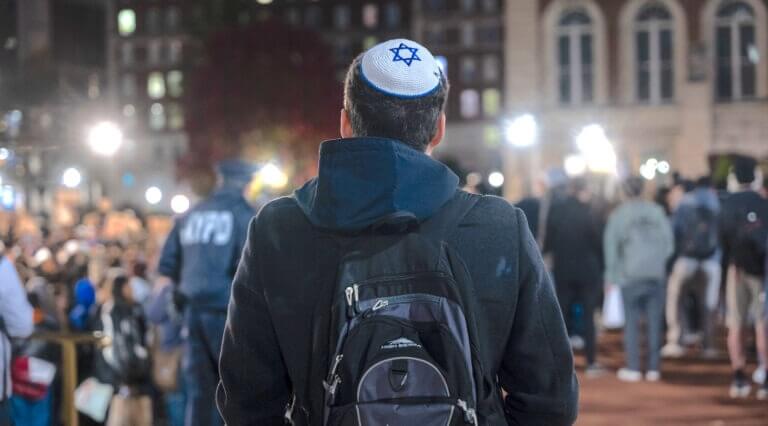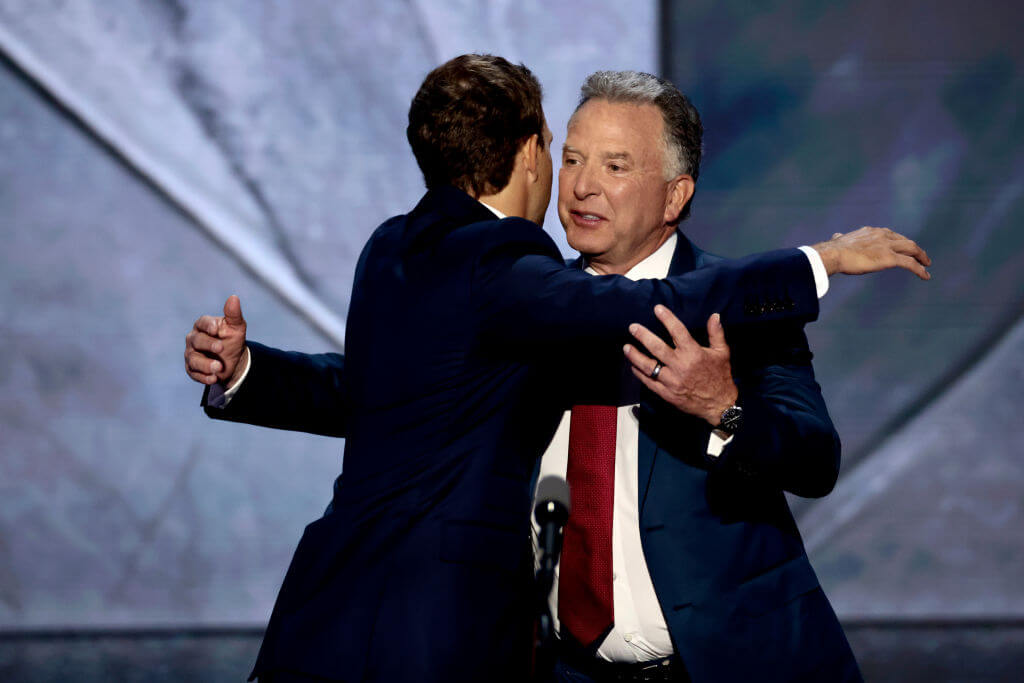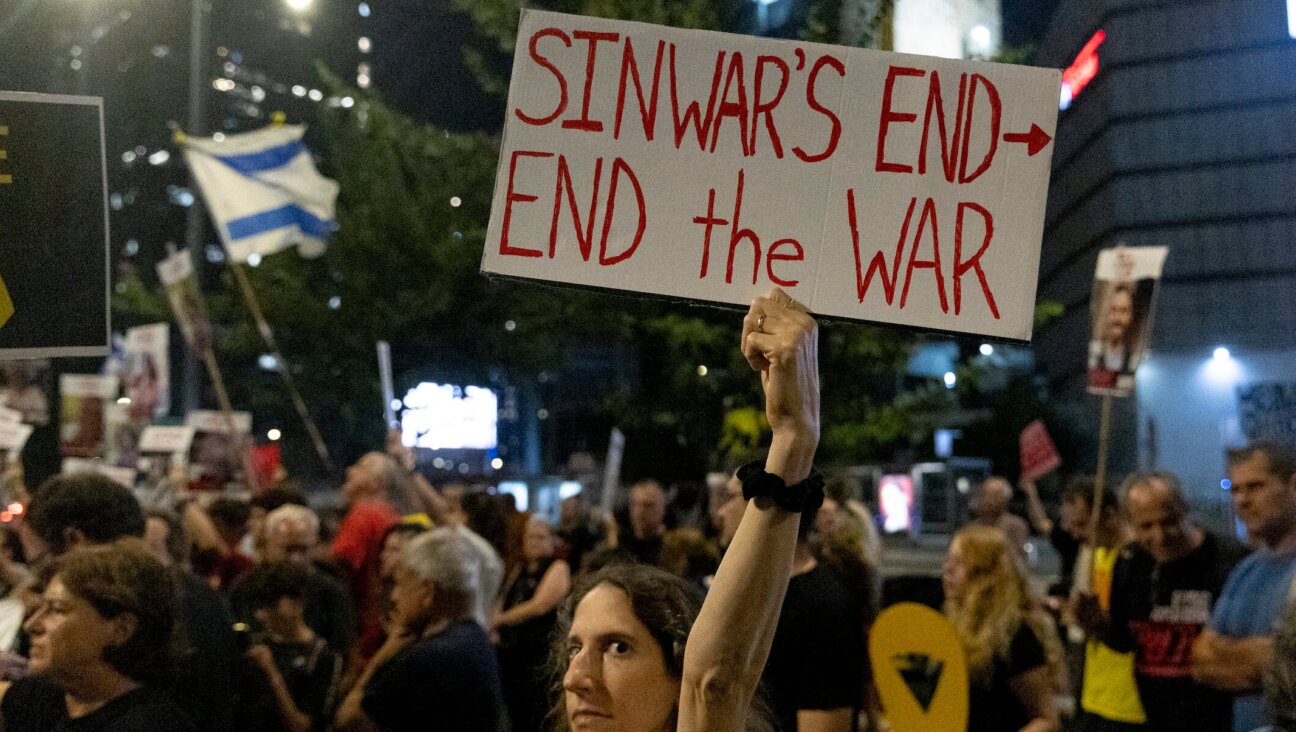When Being 86 Is No Big Deal

No Enemies: Fyvush Finkel, 86, performs at the YiddishTheatre-Folksbiene gala. Image by Karen Leon
FOLKSBIENE GALA — A DELIGHTFUL SHOW THAT ENDED ON TIME!

No Enemies: Fyvush Finkel, 86, performs at the YiddishTheatre-Folksbiene gala. Image by Karen Leon
With a high-kicking ensemble performing an excerpt from “The Golden Land”; NBC Nightly News anchor Brian Williams’s seasoning his video greetings with such Yiddishisms as nakhas, mentschlekhkeyt and spilkes (pins), and master of ceremonies Freddie Roman ladling Borsch Belt jokes, the June 8 National Yiddish Theatre-Folksbiene gala at Town Hall was off and running. Accompanied by sons Ian Finkel on xylophone and Elliot Finkel on piano, Papa Fyvush Finkel told the audience: “Don’t applaud. Being 86 with this audience is not a big deal. I have no enemies in my profession. I have outlived them all.” Stunning in a body-fitting gown, Vanessa Hidary wowed the audience with her original, riveting hip-hop rendition of herself as a Jewish woman. The program as written and directed with pizzazz by Tony-nominated director and past Folksbiene artistic director Eleanor Reissa. For the Yiddish-challenged, there were English and Russian supertitles. A stellar cast included Pulitzer Prize wining lyricist Sheldon Harnick, who sang “Do You Love Me?” from his musical “Fiddler on the Roof.” Daniella Rabbani, graduate of the Stella Adler Studio and Folksbiene alumna, did a superb imitation of the late great stage and film star Molly Picon. Under the baton of artistic director Zalmen Mlotek, the event honored Holocaust survivor Ernest Michel, executive vice president emeritus of UJA- Federation of New York and champion of his fellow survivors.
John Ruskay, UJA-Federation’s executive vice president and CEO, introduced the guest of honor. “I am a Yekke [German Jews] who learned Yiddish in Auschwitz-Buna, Michel said. He recalled meeting Elie Wiesel in Buna, and explained that Wiesel–the gala’s honorary chairman–was in Buchenwald with President Obama.”We were a small group of starving inmates in April 1943 when in the corner of the barrack, we whispered, “Next Year in Jerusalem.” Michel, author of “Promises Kept” (Barricade Books, Inc. 2008), said he came to America with $10 in his pocket and had a 63-year long career with the UJA-Federation where he helped mobilize Jews. “On June 18, 1981, 6000 survivors from 23 countries and 6 continents gathered in Jerusalem, [for the first World Gathering],” said Michel of the event he spearheaded with the help of the late Benjamin Meed, president of WAGRO(Warsaw Ghettto Resistance Organization). “Nothing in my life will match that magic moment,” Michel told the rapt audience. “[There was ] no applause, total silence, then [Israel’s Prime minister Menachem] Begin concluded his speech: ‘Tonight let us say never will there be another Holocaust. Israel will never allow anyone to develop weapons of mass destruction against the Jewish people.”
Mike Burstyn, recently off-Broadway in “Lansky” sang a very apt, “You Got To Have a Little Mazel.” Cantor Paul Abelson delighted with his signature operatic Yiddish version of “Figaro! Figaro! from “The Barber of Seville.” More Yiddish favorites by Reissa and opera and Broadway veteran Elmore James. Mathew “Motl” Didner, Associate Artistic Director, introduced Sholem Aleichem’s granddaughter, author Bel Kaufman who, spryly informed: “I am 98. My grandfather left me a heritage of love and laughter.” With Mlotek at the piano plus Frank London and the All Star Orchestra, the evening included performances by the Folksbiene Troupe, an ensemble of young Yiddish performers and a chorus composed of Heschel School students.
Ruth Westheimer presented “The National Yiddish Theatre Heritage Award: Second Generation” to psychologist and founding member of The International Network of Children of Jewish Holocaust Survivors , Eva Fogelman. Her accomplishments and credits include author of the Pulitzer-Prize-nominated book “Conscience and Courage: Rescuers of Jews During the Holocaust” and 1984 award-winning documentary, “Breaking the Silence: The Generation After the Holocaust.” Danielle Sarna was presented with The National Yiddish Theatre Heritage Hemshekh Award Third Generation.” Voted “Outstanding Student Leader on Campus by Hillel International in 2006. A member of Alpha Epsilon Phi, a sorority founded at Barnard in 1909 that is dedicated to inspiring and supporting exemplary women who build on the vision of its Jewish founders , her bio notes: “She lives up to the legacy handed down by her Holocaust survivor grandparent and 2 G(Second Generation) parents–Anita Perkiel and Mark Sarna who met at the historic first Holocaust World Gathering in Israel in1981. “
“It’s a miracle we are all here,” smiled Jeffrey Wiesenfeld, National Yiddish Theatre/Folksbiene chairman of the board , who thanked the audience for coming. And miracle of miracles: The invitation stated: “Doors open: 7:00 pm; Curtain: 7:30 pm; Program ends; 9:30 pm. And that’s exactly what happened! A good omen for next year’s gala.
A CONVERSATION WITH ROBERT MORGENTHAU, CHAIRMAN OF THE MUSEUM OF JEWISH HERITAGE-A LIVING MEMORIAL TO THE HOLOCAUST
“Mrs. Roosevelt came down every day when I had an ear infection,” Manhattan District Attorney Robert Morgenthau recalled during his conversation with writer Marie Brenner at the June 4 women’s luncheon at the Museum of Jewish Heritage-A Living Memorial to the Holocaust. “Mrs. Roosevelt and my mother, Eleanor, were friendly…. She’d give parties, cooked hot dogs when the King and Queen of England came here in 1938. I used to cook for Mrs. Roosevelt….”
Following welcoming remarks by luncheon chair and museum trustee Patti Kenner and museum director David Marwell, the 400 women at The Pierre were treated to a film, “A Good Man: A Tribute to Robert M. Morgenthau,” narrated by Steven Spielberg. The film presented highlights of the Lehman and Morgenthau families’ contribution to the Jewry of America and the world. It opens with a shot of the honoree as a sweet 5-year-old with the voice-over saying: “Can this be the face that terrified every bad guy in New York City?” Beneath the tough exterior, though, there lurks something of a comedian. During the question-and-answer session, Brenner lauded Morgenthau for having given his life jacket to a fellow Navy man after his ship was sunk during World War II. Morgenthau snapped back, “It was the dumbest thing I ever did!” Morgenthau, as the catalyst for the museum, was the centerpiece of the “conversation.” The museum, which was in close range to the destruction of the Twin Towers and had a new R.M. Morgenthau wing, had an iffy start. Morgenthau recalled that when he first raised the idea of building a museum dedicated to the Holocaust and remembrance, “a lot of people in New York told me ‘Go to hell, Bob!’ Had I known it was going to be so difficult, I might not have done it.” The interview covered his grandfather’s arrival in America in 1873 from Manheim, Germany, and the extended “Our Crowd” family interconnections. But at the heart of the “conversation” was the Morgenthau family’s service to America and its Jewish imperative. His grandfather had been appointed in 1913 by President Woodrow Wilson as ambassador to the Turkish Ottoman Empire. In 1934, his father was appointed secretary of the Treasury in Franklin Delano Roosevelt’s administration. In 1940, Morgenthau — who later would indict some 130,00 suspects annually — enlisted as an officer in the U.S. Navy.
Morgenthau recalled his grandfather receiving letters from relatives in Germany. “He sent them money on a regular basis… finally he ran out of money. Of 90 relatives, 55 came here. One 1938 letter he sent containing affidavits stated: “It is very difficult here. Don’t come here unless you have lots of money.” Brenner prompted, “Your father had to walk a fine line between being Jewish and acting as secretary of the Treasury.” She mentioned that he had a blond secretary, Henrietta Klotz, who spoke Yiddish. Morgenthau chuckled: “People would come in thinking no one understood. One man fainted in the office, then turned to a rabbi with the group and, in Yiddish, asked, ‘Did it look real?’ Klotz understood, but she never let on.
Brenner referred to his father’s involvement in bringing the 1,000 refugees to Oswego, N.Y. — a feat described by now 97-year-old journalist Ruth Gruber, who was in the audience and who chronicled this saga in her 2000 book “Haven” (Three Rivers Press), which was made into a TV docudrama by the same name. “Harry Truman wanted to impeach [secretary of the Treasury] Morgenthau for bringing the refugees over here,” said Morgenthau, who offered a few more uncomfortable Truman vignettes. “Truman took father on after the war…. He was fighting to get Israel established. In 1946, Truman said ‘No!’ He wrote in his diary: ‘The Jews have no sense of proportion nor judgment on world affairs. Father wanted to put pressure to allow the ‘Exodus’ to land. Truman’s response was: ‘Jews are like all underdogs. When they get on top, they are just as cruel [as the people below them].’… Two years later, he made the decision to establish Israel.” Brenner asked about Truman’s turnaround. Morgenthau smiled and said: “Truman was a political animal. He knew that to be elected, he had to do something for the Jews…. After the war, Truman abolished the War Refugee Board, claiming ‘The war is over,’ leaving thousands of refugees in a desperate limbo.”
In 1938, Morgenthau’s father took him on a trip to Europe. “I was fresh from Amherst…. Father did not trust cables from the State Department…. We went to the Riviera, the French-Italian border to Switzerland. The passes were full of soldiers in Zurich… on the Rhine, in the Black Forest…. I wanted to go to Germany, but father said, ‘You will never go to Germany.’” In the summer of 1991, Morgenthau took his own 6-year-old son and 16-year old grandson to Germany to visit Morgenthau’s grandfather’s birth city, Manheim. “I didn’t wear a Star of David on my lapel,” Morgenthau recalled. “But when we got into a cab to go to the airport, the driver turned to us and said, ‘I guess you’ll be flying El Al.”
REMEMBERING JOSEPH “YOSL” MLOTEK ON THE NINTH ANNIVERSARY OF HIS PASSING
Were it not for Yosl Mlotek, Yiddish in America — both for children and for adults — never would have had the success and longevity that continues to this day. The Yiddish schools, Yiddish festivals and music that he and his wife, Chana Mlotek, and his sons, Zalmen and Mark “Moishe” Mlotek, have established and orchestrated resonate across the country. At the commemorative event this past May at the Center for Jewish History, the Klezmatics were presented with the Mlotek Prize for Yiddish and Yiddish Culture. With Zalmen at the piano, Mark as master of ceremonies, the Mlotek grandchildren — Elisha, Marissa, Sarah, Avram and Lee — participating in Yiddish, and Chana in the audience, it was a landmark moment in, as they say in mameloshn, in der yidisher kultureler velt ( the world of Yiddish culture).
As part of the evening’s salute, Robert Abelson, Phyllis Berk and Judy Bressler presented a concert of songs by Yiddish song giant Mordechai Gebirtig, “The Yiddish Folk Troubadour,” written by Yosl Mlotek. It is also possible that the Folksbiene, now known as the National Yiddish Theatre, would not be in existence were it not for the imprinting that Zalmen Mlotek received in the Mlotek home.
For me, Yosl Mlotek was a presence since childhood. As a gift for my fifth birthday in Warsaw, my parents gave me a bound volume of Kinderfraynt, a children’s magazine that Mlotek wrote and edited. As a teenager, he was at the Medem-Sanatorium, outside of Warsaw, where as “chairman of the children’s republic” he was a theater and radio producer the year I was there as a camper. He and my father fled Warsaw as the German bombs were falling. Both fled to Vilna — where he and my father worked at the YIVO Institute for Jewish Research..
After my father was arrested by the NKVD on August 29, 1940, it was Mlotek whom I first told of the arrest. He, in turn, sounded the alarm to the others to go into hiding.Recipients of Sugihara visas, we traveled on the same Trans-Siberian train to Vladivostok and then to Japan. Mlotek helped organize my birthday in Kobe, Japan, in 1941 and shared a house with my mother and me. Our landlord was a former general of the czar.Sent to Shanghai, where he spent the war years, Mlotek worked for the Yiddish community and wrote for Yiddish papers and magazines. Later, he settled in Calgary, in Alberta, Canada, before coming to the United States I was working at YIVO in New York after school (George Washington High School) when Chana Gordon (then my “boss”) returned from Los Angeles, where she had met Mlotek.
A teacher in the Workmen’s Circle/Arbeter Ring school system, he eventually would become known as “the address for Yiddish.” He wrote Yiddish books, was a force behind the Folksbiene, arranged for concerts and lectures, wrote educational books in Yiddish and volumes of poetry and songs, and was on the “Forward Hour” radio show. He produced records so that the mass audience could hear videotapes of Yiddish children’s songs. Mlotek also organized the first ethnic concerts in the city parks. More than 25,000 people came to Central Park to see Sholom Secunda and Molly Picon for free. In another culture, he would be referred to as a “National Treasure.”
A message from our Publisher & CEO Rachel Fishman Feddersen

I hope you appreciated this article. Before you go, I’d like to ask you to please support the Forward’s award-winning, nonprofit journalism during this critical time.
We’ve set a goal to raise $260,000 by December 31. That’s an ambitious goal, but one that will give us the resources we need to invest in the high quality news, opinion, analysis and cultural coverage that isn’t available anywhere else.
If you feel inspired to make an impact, now is the time to give something back. Join us as a member at your most generous level.
— Rachel Fishman Feddersen, Publisher and CEO






















